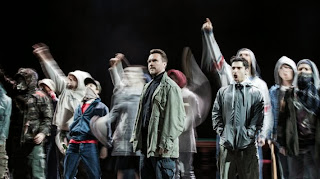Arjun Appadurai is a senior professor of media, culture and communication at NYU. His (remote) appearance at Themester was arranged in collaboration with a Mellon-funded project, "Framing the Global," and a conference on the same subject.
Appandurai's main field of expertise is the cultural effects of globalization. His talk was unusual for its focus on American economics and their influence of the "global capitalist imaginary."
What struck me in this talk was Appandurai's interest in thinking about the "human side" of our new economy. He said that at present, a small number of us are "risk takers" while the rest of us are "risk bearers" in a market that makes most of its profits from derivatives--that is, bets taken on various loans, swaps or exchanges. Appandurai's question was how this economy became an accepted Western norm. In attempting to push past the Occupy movement's demonization of Wall Street, he offered us an account of the psychology that made derivative capitalism--or the monetization of risk--an economic system to which we collectively acquiesce.
For Appandurai, the source of this system was embedded in American religious thought--specifically, the Protestant Work Ethic as described by the influential sociologist Max Weber. In sum, the effort to prove one's (hoped-for) predestined salvation by doing profitable work is to Appandurai the root of a system that monetizes risk.
All the while, I was thinking about Timon, and the question of whether we can humanize the representatives of capitalism in that play. Does Shakespeare ever tip his attention toward the larger stakes of Athens's economy? Does he try to explain the triumph of capitalism over Timon's vision of unstinting Christian generosity? Or is his play an isolated study of a man on the brink (and over the brink)? Does the religious allegory of Timon make Weber's Protestant reading more or less plausible?
(It would also be generative to think about the monetization of risk in All's Well and Helena's venture capitalism. That play is also about credit defaults and the tension between two competing visions of the social structure)
The problem with Appandurai's talk was that it was almost impossible to hear; he was beamed in over Skype and the whole experience was disastrous. About 30% of the talk was lost to technical difficulties. Nevertheless, as an opportunity to think through finance and social structures, it was pretty provocative and useful for its macro view.
Production Shot of the National production of Timonof Athens:
Alcibiades in the Athenian Woods leading his men
From the Occupy webpage: protests on Wall Street, 2009


No comments:
Post a Comment